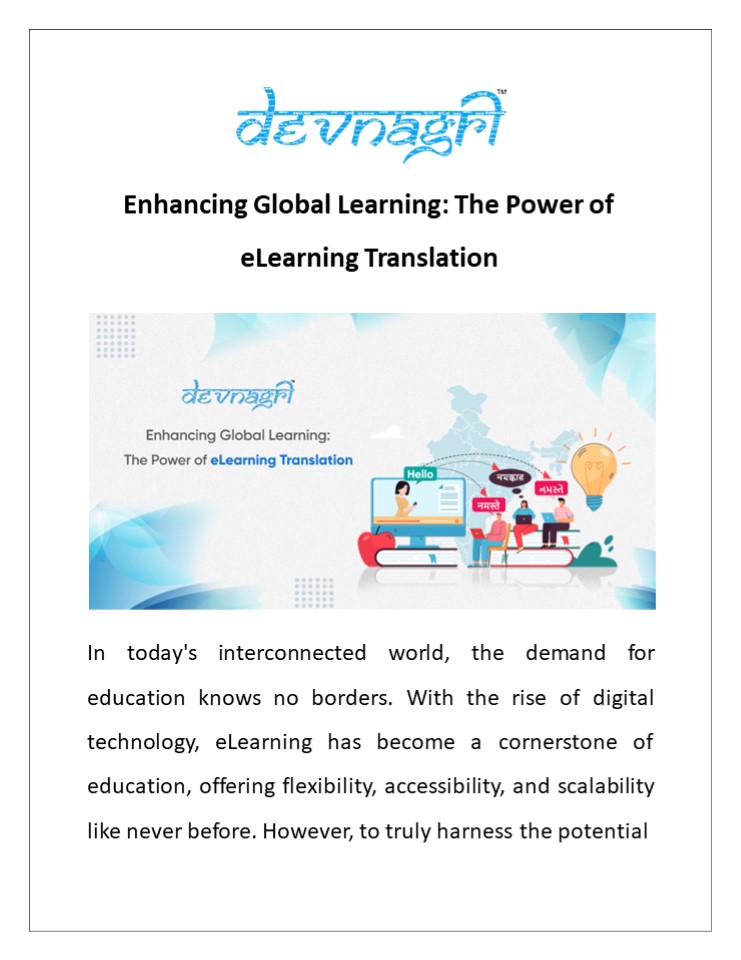Enhancing Global Learning: The Power of eLearning Translation - PowerPoint PPT Presentation
Title:
Enhancing Global Learning: The Power of eLearning Translation
Description:
eLearning translation holds immense potential to bridge linguistic divides and unlock access to education for learners worldwide. Visit Here - – PowerPoint PPT presentation
Number of Views:1
Title: Enhancing Global Learning: The Power of eLearning Translation
1
Enhancing Global Learning The Power of
eLearning Translation
In today's interconnected world, the demand for
education knows no borders. With the rise of
digital technology, eLearning has become a
cornerstone of education, offering flexibility,
accessibility, and scalability like never
before. However, to truly harness the potential
2
of eLearning on a global scale, one crucial
aspect often overlooked is eLearning
translation. Also Read Navigating the Complexity
of Media Translation Bridging Cultures,
Connecting Worlds Imagine a scenario where a
student in Japan wants to
an online course offered by a prestigious in
the United States. Despite having the
enroll in university necessary
skills and motivation, language barriers
prevent them from accessing the course content.
This is where eLearning translation steps in,
breaking down language barriers and making
education accessible to learners worldwide. Also
Read Navigating the World of Publishing
Translation Bridging Cultures Through Words The
Significance of eLearning Translation
3
- eLearning translation involves adapting course
materials, videos, assessments, and other
learning resources into multiple languages,
ensuring that learners from diverse linguistic
backgrounds can fully engage with the content.
The benefits of eLearning translation extend far
beyond mere language accessibility - Cultural Relevance Language is deeply
intertwined with culture. By translating
eLearning content, educators can tailor the
material to resonate with learners' cultural
backgrounds, fostering a deeper understanding
and connection. - Global Reach Translation transforms eLearning
platforms into global learning hubs, reaching
learners in every corner of the world. This
expanded reach not only benefits individual
learners but also contributes to the
democratization of education on a global scale.
4
- Enhanced Learning Experience When learners can
access course materials in their native language,
comprehension improves, leading to a more
enriching learning experience. This is
particularly crucial in complex subjects where
nuanced understanding is paramount. - Market Expansion For educational institutions
and eLearning platforms, offering translated
content opens doors to new markets and revenue
streams. It - enables them to tap into diverse demographics and
cater to the needs of multilingual learners. - Also Read Navigating the Complexities of Finance
Translation Ensuring Accuracy Across Languages - Overcoming Challenges in eLearning Translation
5
While the benefits of eLearning translation are
clear, the process is not without its
challenges. Here are some common hurdles and
strategies to overcome them 1.
Quality Assurance Maintaining the integrity and
accuracy Working
of translated content is paramount.
with professional translators who are
- proficient in both the subject matter and the
target language is essential to ensure
high-quality translations. - Consistency Consistency across translated
materials is crucial for seamless
learning experiences. - Establishing style guides, glossaries, and
terminology databases can help maintain
consistency throughout the translation process. - Technical Compatibility eLearning platforms
often rely on specific formats and technologies.
Translated content must be compatible with these
platforms,
6
which may require additional testing and
adaptation to ensure optimal functionality. 4.
Cost and Time Constraints Translating
eLearning content can be time-consuming and
costly, especially for large-scale projects.
Leveraging technology such as machine
translation and translation management systems
can streamline the process and reduce
costs. Also Read Navigating Global Markets The
Vital Role of Website Translation Best
Practices for Effective eLearning Translation To
maximize the effectiveness of eLearning
translation, it's essential to follow best
practices tailored to the unique requirements of
online learning 1. Collaboration Foster
collaboration between subject matter experts,
instructional designers, and
7
- translators to ensure accurate and contextually
relevant translations. - Multimedia Localization Beyond text translation,
- consider localizing multimedia elements such as
videos, images, and interactive simulations to
provide a truly immersive learning experience. - User Feedback Solicit feedback from learners to
identify any linguistic or cultural barriers they
may encounter. This feedback loop can inform
iterative - improvements to the translated content.
- Continuous Improvement Treat eLearning
translation as an ongoing process rather than a
one- time task. Regularly review and update
translated materials to reflect changes in
content, technology, and learner needs. - Also Read Exploring the Power of Translation
APIs Breaking Language Barriers in a Connected
World
8
Conclusion eLearning translation holds immense
potential to bridge linguistic divides and
unlock access to education for learners
worldwide. By embracing eLearning translation
as an integral part of online education initiative
s, eLearning
educational institutions, businesses, and
platforms can create more inclusive, impactful
learning experiences that transcend geographical
and linguistic boundaries. As we continue to
harness the power of digital technology in
education, let us not forget the transformative
role that eLearning translation plays in shaping
the future of learning on a global scale. Source
Enhancing Global Learning The Power of
eLearning Translation































